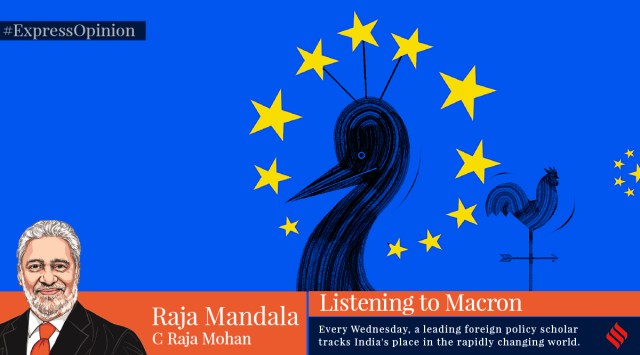C Raja Mohan writes: Macron’s distancing from US, statement on Taiwan — India needs greater engagement with European geopolitics, not less
C Raja Mohan writes: Both Asia and Europe are divided on attitudes towards US, China. Those Asian powers that can better navigate the current contradictions within the West are likely to benefit the most
 C Raja Mohan writes: Beijing’s official media says Macron offers the model of “strategic autonomy” for the rest of the world to follow on China. (AP)
C Raja Mohan writes: Beijing’s official media says Macron offers the model of “strategic autonomy” for the rest of the world to follow on China. (AP) Last week, French President Emmanuel Macron declared France is “an ally but not a vassal of the United States”. Macron was defending his comments to the press on his way back from China that Paris does not share Washington’s hostility to China and that he does not see the Taiwan crisis as a threat to Europe.
Macron’s remarks generated much outrage in the US and Europe but are welcome in China. Beijing’s official media says Macron offers the model of “strategic autonomy” for the rest of the world to follow on China. Beijing loves to see key nations refusing to challenge China’s hegemonic policies in Asia in the name of pursuing “strategic autonomy” from the US. Russia too hopes that France and others in Europe will be less tied politically to the US. Yet, Russia itself is moving closer to China since it launched the war against Ukraine. Some analysts are accusing Russia of becoming a “vassal” of China.
What is going on here? It is quite strange to think of major nuclear powers and permanent members of the UN Security Council like Russia and France as “vassals” to the US and China.
The debate in reality is not about either Europe or Russia becoming subalterns to the US or China. In fact, the US has been urging Europe and its allies to take a larger responsibility for their own security and not depend on it. But Europe has not been willing to devote the resources necessary for such a purpose and has been happy to rely on the US for its security.
France, of course, has a long tradition of defying the US, but Paris has always modulated that tendency within reasonable bounds. The effort to limit Europe’s differences with the US on China was quite visible at the G7 foreign ministers meeting in Japan this week. In the case of Russia, Putin’s decision to wage war against Ukraine has shrunk his options to just China. This would certainly change if and when Moscow manages to end its current political isolation.
The debate on the “vassalisation” of Europe and Russia, however, highlights five important trends.
For one, Macron’s claim that Taiwan is not of concern to Europe appears to reinforce our External Affairs Minister Subrahmanyam Jaishankar’s criticism of Europe last year. Jaishankar had said, “Europe has to grow out of the mindset that Europe’s problems are the world’s problems, but the world’s problems are not Europe’s problems.” The minister’s Ukraine remarks drew much political flak from Europe. The fact is that both principle and power are at stake in Ukraine and Taiwan. If Russia’s use of force to seize its neigbhour is unacceptable to the world, so should China’s territorial expansionism in Asia.
In Ukraine, India is right to point to the debilitating consequences of the war for the rest of the world. A shooting war between the US and China over Taiwan might be more devastating and costly to the international system than the war in Ukraine. Macron’s comments on China and Taiwan are also disappointing because they contradict the French president’s declared approach to the Indo-Pacific in the recent past. Paris was among the first European countries to claim an important role in the Indo-Pacific. For Asian countries like India at the receiving end of Chinese bullying on their borders, it will be tempting to conclude that the French resolve on China is wavering.
Second, it is quite clear that Macron does not represent all of Europe. The President of the European Commission, Ursula von der Leyen had a very different take on China than that of Macron. Before she travelled to Beijing with Macron, von der Leyen gave a tough speech highlighting the challenges that China presents Europe. The Central Europeans have been strongly critical of Macron’s framing of the China problem and his calls for “strategic autonomy” from the US. The Central Europeans tend to trust the US more than France or Germany to defend their security interests.
There is no question that Europe is deeply divided on how to address the contemporary security challenges and that, in turn, undermines Macron’s ambition to turn Europe into the world’s third superpower. The only common belief in Europe today appears to be the political faith in Beijing’s capacity to end Russia’s war in Ukraine.
Third, a weaker and divided Europe is enhancing the prospects for a bipolar world. For more than three decades, the pursuit of multipolarity has been an important objective of India’s foreign policy. The talk of multipolarity in the 1990s was about the fear of a “unipolar world” dominated by America after the collapse of the Soviet Union. More recently, it has been about the fear of a “unipolar Asia” centred around China. The talk about “multipolarity”, however, could become academic as the US and China pull way ahead of other powers, get deeper into a confrontation and shape the choices of the rest of the world. The belief that Europe and Russia can act as elements of a multipolar world then is becoming increasingly untenable.
If India’s principal contradiction today is with China, Delhi can’t bet on either Europe or Russia to balance Chinese power in Asia. India has long relied on Russia – or the eastern part of Europe — to produce a regional balance of power in Asia. More recently, it has been enthused by the plans of various European powers to take a larger role in the Indo-Pacific. If both western and eastern parts of Europe look to China for their salvation, their utility for India would decline.
Fourth, does that mean Delhi should turn its back on Europe? On the contrary, Macron’s China push underlines India’s own possibilities in Europe. A Western Europe that follows the money in China could do the same in India. If Delhi can make it easy for European businesses to grow in India, it can get much strategic benefit out of the partnerships with Brussels and individual European actors.
India is also stepping up its engagement with Russia on the calculation that Moscow’s current dependence on Beijing is temporary. The jury is out on this question though.
Fifth, the inability or unwillingness of both Russia and Western Europe to balance China means India needs to work much more closely with the US and its Asian allies to secure a more favourable balance of power in its Indo-Pacific neighbourhood.
It is equally true that the strategic value of India will only go up for the US amidst the European reluctance to stand up to China’s hegemonic ambitions. After all, few countries in Asia face more urgent and daunting challenges from China than India. And few Asian capitals have more political will to stand up to Beijing than Delhi. Meanwhile, the reduced standing of Europe and Russia in great power relations is accompanied by Asia’s rise. China is already a dominant player in the world and there are emerging strategic opportunities for Japan, India and South Korea.
What about the divisions within Asia? Clearly, Asia is as divided as Europe is. Those Asian powers that can better navigate the current contradictions within the West are likely to benefit the most. That, in turn, suggests that India needs greater engagement with European geopolitics and not less.
The writer is senior fellow, Asia Society Policy Institute, Delhi and contributing editor on international affairs for The Indian Express









































